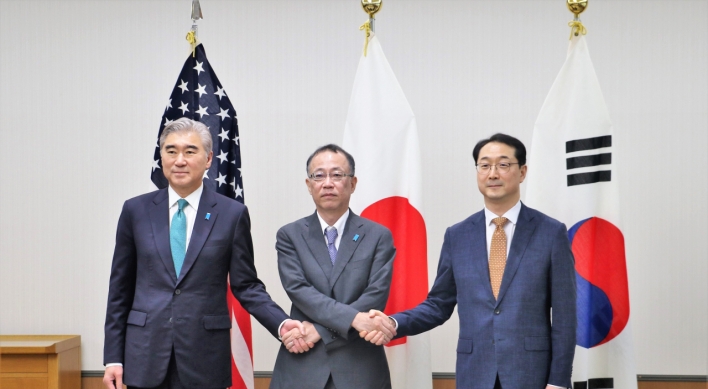A mammoth United Nations fund will set up its head office in Songdo, Incheon, next year, the fund’s board members decided Saturday, which officials here hope will greatly boost Korea’s international profile.
Songdo, Incheon’s newly-developed urban district, beat Bonn in Germany and four other cities in the race to host the secretariat of the Green Climate Fund.
The GCF is a new U.N. entity which will channel up to $100 billion a year by 2020 to help developing countries fight climate change.
“Since climate change is the main challenge confronting the mankind, the GCF will, and should, grow bigger and have many subordinate bodies,” President Lee Myung-bak told a press conference in Songdo on Saturday. The conference was held shortly after Songdo was announced the winner of several rounds of voting by board members to select the secretariat’s location. Vote counts were not disclosed.
Songdo, Incheon’s newly-developed urban district, beat Bonn in Germany and four other cities in the race to host the secretariat of the Green Climate Fund.
The GCF is a new U.N. entity which will channel up to $100 billion a year by 2020 to help developing countries fight climate change.
“Since climate change is the main challenge confronting the mankind, the GCF will, and should, grow bigger and have many subordinate bodies,” President Lee Myung-bak told a press conference in Songdo on Saturday. The conference was held shortly after Songdo was announced the winner of several rounds of voting by board members to select the secretariat’s location. Vote counts were not disclosed.

The result is subject to a final endorsement at the U.N. Climate Change Conference in Doha, Qatar, at the end of the year.
First proposed in 2009 and established in December 2011, the GCF is meant to be the single largest channel for delivering money to developing countries to help them cut greenhouse gas emissions and adapt to the impact of climate change.
Rich countries have pledged to commit $100 billion per year for the fund by 2020.
Key details of the fund are yet to be drawn up, such as who should run it and how it will operate and raise funds.
The secretariat, to be established early next year, will be housed in I-Tower, a building exclusively designed for international organizations. Korean authorities have pledged to provide free of charge 15 floors of the 33-story building, which will be completed later this year.
“The GCF in Songdo will provide the basis for Korea to grow into the center of global green efforts,” Finance Minister Bakh Jae-won said.
The minister and other Korean officials had asked the fund’s board members to support Songdo, the only Asian location in the race, on the grounds that its selection would help balance international environmental organizations which are mostly based in Europe and would also be a display of the fund’s commitment to supporting developing countries.
Many Koreans see Songdo’s winning of the race against tough European competitors such Bonn and Geneva, as a recognition of the country’s ongoing efforts to make its economy greener and share with other countries its experiences along the road.
Korea is an aspiring leader in the global environmental field.
The country has set green growth as the new national development vision in 2008 and has since been spending 2 percent of its growth domestic product to implement related policies. It has pledged $40 million to the GCF.
Last week, the Global Green Growth Institute, which started as a state-run think tank of green growth policies, became an international organization. The country also set up the Green Technology Center in Seoul.
The GCF office in Songdo is expected to boost the profile of Korea and Songdo on the U.N. map.
Songdo already has 10 offices of various U.N. bodies, but the GCF secretariat will be by far the biggest.
It is expected to have 300 to 500 employees in the initial period, which will rise to several thousand once the fund gets up and running.
“It’s like a giant multinational company’s coming to Korea for a new base,” Minister Bahk explained.
The establishment of the GCF office will also bring significant economic benefits to Songdo, which aims to become an international business center in Northeast Asia.
The Korea Development Institute, a state-run think tank, estimated the expected benefits to be about 380 billion won ($341 million) a year, presuming that the GCF keeps a workforce of 500 here.
By Lee Sun-young (milaya@heralcorp.com)
-
Articles by Korea Herald










![[New faces of Assembly] Architect behind ‘audacious initiative’ believes in denuclearized North Korea](http://res.heraldm.com/phpwas/restmb_idxmake.php?idx=644&simg=/content/image/2024/05/01/20240501050627_0.jpg&u=20240502093000)
![[Music in drama] Rekindle a love that slipped through your fingers](http://res.heraldm.com/phpwas/restmb_idxmake.php?idx=644&simg=/content/image/2024/05/01/20240501050484_0.jpg&u=20240501151646)







